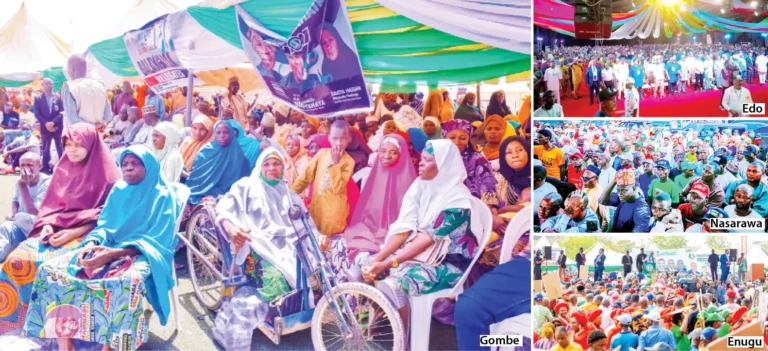
Nigeria may be forfeiting millions of potential jobs by failing to prioritise agriculture, according to a new data-driven report presented in Lagos by leading economists and policy experts.
The report points that the country faces a critical choice: maintain an import-dependent system that hemorrhages jobs, or invest strategically in agriculture to drive mass employment, industrialisation, and economic resilience.
The findings paint a stark picture of a country sitting on enormous employment potential yet unable to unlock it due to inconsistent policies, weak institutions, and chronic underinvestment in the agricultural sector.
At a public presentation of the book: How Africa Eats: Trade, Food Security and Climate Risks, authored by a leading trade and development expert, Professor David Luke, scholars warned that Nigeria and Africa’s job crisis and food insecurity stem from the same root problem: an abandoned agricultural system that should be driving continent’s growth. The experts argued that agriculture—Nigeria’s natural comparative advantage—could become the economy’s largest employer if the sector received coherent support.
The report stressed that modernising agriculture would not only boost food production but also generate jobs across the value chain: processing, storage, logistics, mechanisation services, input supply, digital agriculture, and export-driven agro-industries.
Yet these opportunities remain largely unrealised, creating a paradox where Africa battles mass unemployment while sitting on one of the world’s most labour-absorptive economic sectors.
Beyond highlighting failures, the experts also offer a wake-up call declaring that agriculture is not merely a development issue, but the foundation for Africa’s employment future.
They argue that unless the continent reforms agricultural policies, addresses insecurity in farming communities, and ramps up investment in mechanisation and climate resilience, the country will continue “importing food and exporting jobs.”
The experts maintain that the path is clear. With the right policies, Nigeria and indeed, Africa, can transform agriculture from a neglected sector into a national job engine.
Without such action, the job crisis and food crisis will continue to feed each other—pushing the continent deeper into dependency.
Speaking, Professor Babatunde Adeoye of the University of Lagos, UNILAG, warned bluntly that “if more than two-thirds of the countries in Africa are still net importers of food items, then we need to wake up in this part of the world and realise that our fate is in our own hands. Nobody is coming here to help us.”
He linked Nigeria’s food crisis directly to unemployment, stating that the failure to invest in agriculture means job losses across multiple sectors. According to him: “It is because we don’t give priority to agriculture that we are not food-secure. When we look at the ripple effects of food insecurity, it results in various social vices… because our governments are not taking agriculture seriously in terms of budgetary allocations and interventions.
“Our farmers cannot go to the farm anymore because they are not secure. There is no food production.” He further criticized the exploitative farm-gate pricing system, noting that “many intermediaries between the farmers and the final consumers… exploit the farmers,” weakening income and employment opportunities in rural communities.
On his part, the author of the book, Prof. Luke, stressed that ignoring agricultural investment is a moral and economic failure. He noted that over 200 million Africans face food deprivation yet governments appear unfazed.
“We should not normalise food deprivation on this continent. A third of Africa’s population is food insecure… these are staggering numbers.”
Luke highlighted the employment potential hidden within Nigeria’s food system, explaining that agricultural competitiveness has collapsed under global subsidy pressures.
“African producers struggle to compete globally because such products are heavily subsidized outside the continent,” he said.
The result, he added, is that Nigeria and 41 other African countries remain net food importers—a situation that drains jobs from local producers and processors.
He explained that agriculture remains the world’s most jobs-intensive sector, and governments outside Africa treat it as such: “Globally, agriculture is treated differently… because it concerns food security, livelihoods, and employment across the value chain. For these reasons, governments intervene in agriculture — and this is where Africa falls short.”
Professor Olawale Ogunkola, also of UNILAG, underscored the scale of the policy incoherence sabotaging Nigeria’s agricultural employment potential. “The key issues are policy coherence, policy consistency, and collaboration,” he said. He lamented that ministries and departments “defend their individual budget lines” rather than pursue national goals.
Addressing fears that mechanization will kill jobs, he strongly disagreed, saying: “Mechanization will create a new set of jobs — technically skilled and technologically driven roles… It is a win-win situation.”
According to him, tractors, solar-powered irrigation, and modern tools would attract younger, tech-savvy Nigerians into agriculture instead of pushing them away.
Ogunkola also insisted that poor monitoring and corruption undermine Nigeria’s agricultural institutions. “Nigeria is good at formulating policies, but implementation remains the problem. Many of our leaders should be held accountable. We need to do things properly.”
In the same vein, the Friedrich Ebert Stiftung (FES), Resident Representative in Nigeria, Professor Lennart Oestergaard emphasized that agriculture holds the potential for both decent work and economic transformation. He noted: “If countries like Nigeria can begin to export more finished goods, it would be a game-changer for their economies. This research is rich in data and should serve as an eye-opener for policymakers. Africa must move beyond exporting raw commodities and importing finished goods, including food. Europe also needs to look inward, as its agricultural subsidies distort global markets.”
He warned that European policies often “create problems for producers in other countries,” thereby limiting Nigeria’s productivity, competitiveness, and job-creation potential.
VANGUARD.




